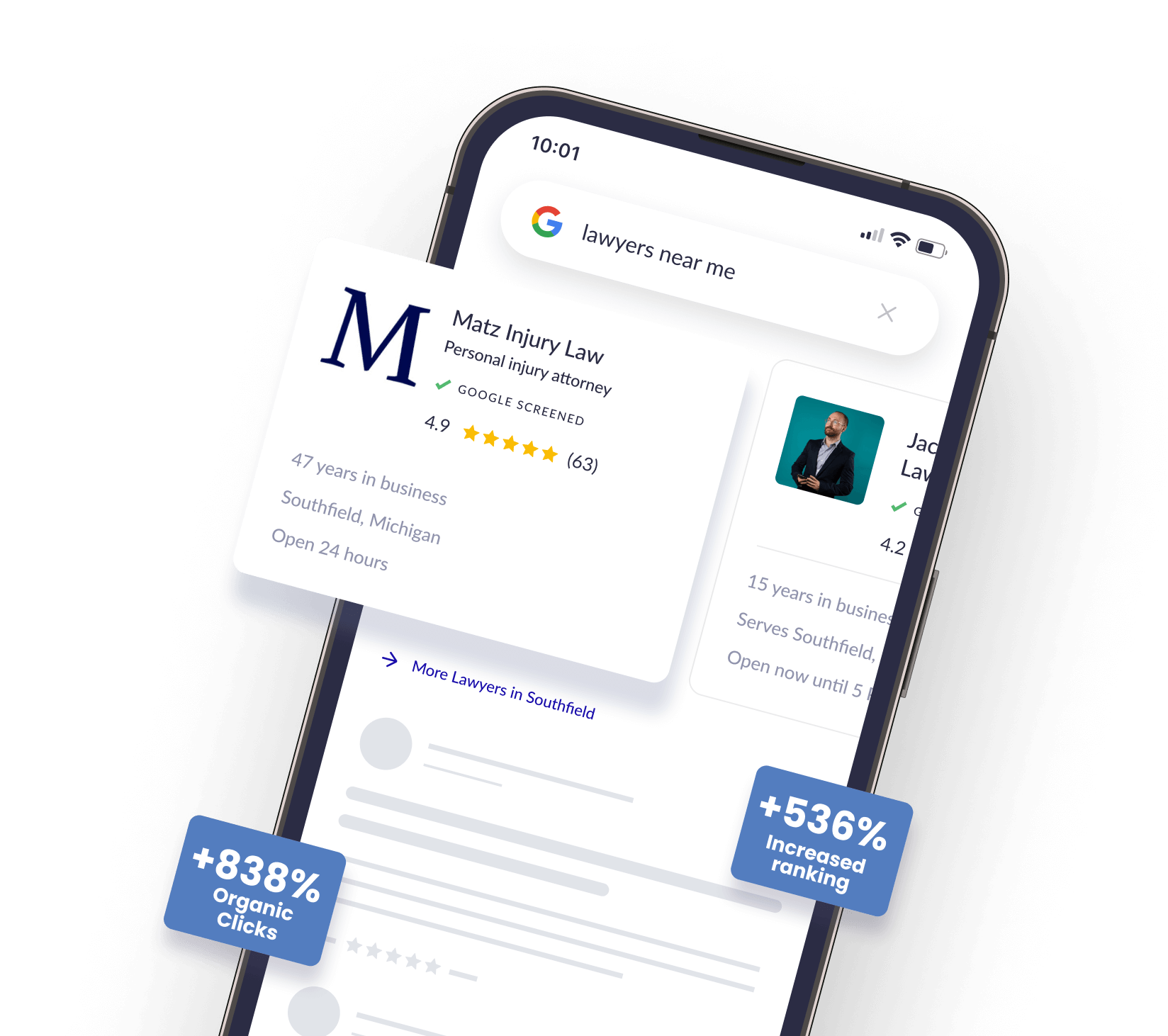Blog
Keys to Making Your Law Firm’s Web Content Unique

- Content and SEO are two essential and similar (though not the same) strategies for reaching your legal prospects online. Knowing the difference and how to utilize both is critical.
- Legal content marketing is a method of reaching your would-be prospective clients in a meaningful way.
- Building a legal marketing strategy enables law firms to have a plan to determine their target audience and map out the best way to both stand out in a competitive industry and provide valuable, brand-building content.
- Working with legal SEO experts at Array Digital streamlines the process and ensures the best outcome for law firms.
There is a plethora of content published online. In fact, around 7.5 million blogs are published every day. How do you go about creating content that stands out among the sea of publishing, running your law firm, and dealing with day-to-day lawsuits?
Creating a unique conversation online that captivates your audience is possible with the right marketing team, research, and strategy.
How Content and Seo Are Related
Content and search engine optimization (SEO) are two connected components of law firm marketing. Though many law firms believe they are very different strategies, a more accurate view is that they are two sides of the same coin.
You should not do content marketing without SEO, and SEO is best successful with a proven content marketing strategy.
Content marketing is a method of building trust and authority online, enabling your prospective clients to learn about your firm and why, specifically, it’s beneficial to their needs. Since most of today’s legal clients will try to research to better understand their legal situation long before calling an attorney, you need to be the answer to their questions and easily found online. Content marketing allows people to research for answers and find those answers in your firm.
SEO is the tool that drives search engines like Google into presenting your helpful content to those seeking it out. SEO drives far more control over the traffic your website gets than any other type of digital marketing strategy.

Your law firm website needs to incorporate both to attract potential clients. By using SEO to create highly effective website content, you create the ideal way for search engines to rank you and for prospective clients to make the decision to contact you.
Best Practices for Creating Unique Law Firm Website Content
SEO and content are both valuable components of building your law firm website’s online presence, but doing so and standing out from other firms competing with you takes skill and experience. We can break down some of what it takes through these best practices.
Keep Your Goals in Mind and Develop Brand Awareness
Though you may not initially believe your law firm should have a recognizable brand, building brand awareness is core to your online success. It’s a term that describes how well your target audience recognizes your firm based on its online presence, its authority, or perhaps your long history of helping your personal injury clients receive exceptional compensation for their losses. To stand out online, you need a well-defined brand.
Establish goals surrounding this and then develop your brand awareness in several key ways:
- Make sure your website content shows up in the search engine results pages (SERPs)
- Show up locally in the Google Maps listing and Google Business Profile listings
- Work to capture leads by providing valuable content
You can build brand awareness by putting a personality on your law firm, one that people can identify with and appreciate. Work to interact with your followers on social media and your website’s blog. Be sure to make it easy (and desirable) for people to share your content with others who could be your potential clients.
Define Your Target Audience
Having a well-defined target audience is also important. Though your law firm may take any leads, it’s quite essential to narrow down who your ideal lead is. This enables your law firm to create content based specifically on what those leads are looking for online. Answer these questions to gain clarity:
- Why are your clients coming to you?
- What is it that they need from you?
- What questions are they asking?
- When are they asking those questions?
- What do they need to take the next step?
For example, if you are a personal injury attorney, a person in a car accident may go to Google, type in “Can I file a lawsuit after my car accident?” and then look at the results that appear. Your law firm needs to have content that allows them to get the answer to their question, recognize the value your brand offers, and click through to request a free consultation. High-quality content that directly answers their question is key here.
You cannot create this type of content and build this user experience without understanding who that potential client is and what their needs are.
Delivering the Best User Experience
Assume that this personal injury attorney found the answer to their question on the SERP. They click on your website to learn more. To ensure they become new clients and not just readers, you have to ensure their user experience is efficient, streamlined, and highly engaging. There are several ways you can alter your website design to encourage visitors to become new clients:
- Create an easy-to-navigate website
Your website should have short and scannable sentences. It should incorporate headings and bold type. Make sure your headings incorporate an accurate description of what’s under them.
Long chunks of information are too tiring for a busy person to read. They need answers fast to know if they should read the details or find another law firm website to help them with their legal issues. Ensure a person who comes to your website from your landing page can find the information they need.
Then, build out your website to allow the reader to move from one page to the next, one header to the next, and ultimately to the contact form to request a consultation.
2. Use subheadings to divide your content
Aim to keep each subheading to about 200 to 300 words only. These sections help to further define the main heading but make it easier for website visitors to find the specific topics they are looking for in your content. Subheadings like this help with creating a simple way to navigate complex topics with ease.
Remember that, no matter how much money or SEO you put into your marketing efforts, if you are not giving the reader the information they need and they can easily see that information, they will back out and find another attorney that can. Readable, clear content with subheadings is a core component of this process.
3. Incorporate images and media
While people are coming to your website for information and answers, that first impression is critical. Also, note that the helpful content update Google released in August of 2023 noted the importance of creating content that improves the user experience.
One way to do that is through the use of infographics that summarize legal information. Ensure your content creation lends itself to easy-to-take-in content that people without a legal degree can understand and apply to their lives.
4. Provide case studies
Case studies help potential clients to better understand important topics. As a criminal defense attorney, for example, utilize a case study that shows how your firm helped a client to get charges dropped. This enables the prospective client reading the content to empathize with that party and ultimately helps them recognize what your firm can offer to them as well.
Your Digital Marketing Campaign Is a Journey
Nearly all attorneys want to be in the top position on the SERPs. While this is a good goal and ultimate objective, ensure your digital marketing campaign is building to that point. In other words, don’t expect your content strategy nor your SEO strategy to instantly create success. It is a process that takes time and a lot of hard work to reach the ultimate achievement.
It’s also important not to stretch yourself too thin. You are a busy attorney providing valuable legal services to your clients. It is just as important to build your legal practice through good quality service, fast and reliable communication, and proven results. Avoid putting your mission and law firm success on the line just to reach that #1 spot. Both work together.
Set realistic goals for your web design and content marketing. Put in place a reasonable timeframe, budget, and commitment schedule. Ultimately, turning to a law firm digital marketing agency will alleviate the time constraints on you while allowing you to ensure every investment you make into your web design, SEO, and content strategy pays off.

10 Key Elements of Unique Content Marketing for Lawyers
With an optimized website based on the above best practices, it is now time to consider eight specific elements of marketing your legal website online. These are the strategies you can put in place right now to begin to see a transformation in the leads coming into your law firm.
1. Develop a Basic Understanding of Seo Best Practices
SEO is the way search engines determine when and how to present your website to users. There are several areas to work on first:
- Remove all broken and outdated links from your website. These links stop Google from navigating through the site and indexing each page appropriately. They put all of the hard work you do elsewhere at risk.
- Create unique meta tags and descriptions. These keyword-rich descriptions provide specific instructions to the search engines to determine the value and focus of each page.
- Make sure your website is mobile-optimized. Prospective clients may be looking for your services through a search on their smartphone, and your website design must accommodate those searches.
- Provide a chat box for clients. Make it as easy as possible for clients to ask a question through the inclusion of a chat box on your site. This can greatly improve conversation rates as live chat is critical to providing fast, efficient help for the client who’s landed on your site and wants help.
2. Conduct Keyword Research
Keyword research is an essential component of any law firm’s marketing strategy. Keywords for law firms are those phrases searchers type into the search engines to find information or an attorney. They may be “criminal defense attorney in Miami” or they could be, “Do I need to hire a criminal defense attorney?”
It is not possible to assume keywords associated with your website. That is, it’s critical to do formal keyword research to learn what specific phrases your prospective clients are typing into the search engines. This can happen with the help of various tools, but there must be an in-depth understanding of what your target audience is searching for online.
Additionally, those keywords used on your website must be centered specifically on the services you offer. They should relate specifically to the legal topics related to your practice. Typically, this should align with practice area pages, client questions you receive, and legal industry strategies related to your practice areas.
Your keywords should be long-form. Simply trying to aim for keywords such as “family law” or “personal injury” is very difficult since there is so much competition for them. Rather, our team will refine your keywords to balance competition with what your local target audience is searching for, ensuring that your website ranks for any Google search related to your practice within a given geographical area.

3. Investigate the Competition
Take a look at the search engine rankings right now for some of your target keywords.
- Who are the best-ranking law firm sites for those terms?
- What are they ranking for specifically?
- What does the competition offer that you do not?
Also important is looking for gaps with your target competition. If there is a law firm within your community that provides a similar service, you want to ensure your website content marketing and SEO specifically target to any weak spots in their marketing efforts.
4. Stay Compliant With the American Bar Association
Every component of your law practice must meet the American Bar Association’s legal marketing requirements. This includes wording and phrases, promises and warranties of service, and other claims made on your site.
When it comes to content writing, it is critical not to try to stuff keywords just to rank, especially when it can violate the Bar’s rules. For example, incorporating keywords such as “best family lawyer” claiming to be the best in the area, isn’t ideal. With a trained content writer, it’s possible to build out content that doesn’t violate these rules but still gets valuable keywords into the content in a meaningful manner.
View the table below to see which terms you should avoid on your legal website.
| Promises you cannot keep: | Claims you cannot prove: |
| Guaranteed | Expert/expertise |
| Ensure | Better/best |
| Make sure | Specialist/specialize |
5. Remaining Ada Compliant
Your website also must be ADA compliant to avoid legal fees and a public relations problem. Compliance standards are somewhat complex, but the goal is to ensure your website is accessible to all users. To do this, consider:
- Offer tools like text-to-speech and closed-captioning alternatives
- Ensure the website is easy to navigate with menus and forms that are easy to understand
- Ensure your website design takes into consideration all ADA standards
6. Developing a Targeted Content Strategy
Define what your goals are for any content strategy. This typically starts with driving more leads to your website, but it should also involve getting more people to click on the call to action and set up a consultation.
Your content strategy should have measurable goals, such as the number of unique visitors to your site and conversion rates. The ultimate goal here is to ensure you are measuring more than just how many leads you are getting but also when they leave your site, how long they stay on the site, and if they become paying clients. Your content strategy should specifically relate to these objectives.
To achieve this, you need to determine the best content types and publishing channels for them based on where that target audience is. Once you create a content strategy, monitor it, tweak it, and ensure it is robust enough to grow and expand with your firm over time.
7. Building Case Studies to Support Your Content
Case studies are a powerful tool to drive conversions of website visitors. Develop them to showcase to potential clients what your law firm does for your clients. This could incorporate some client testimonials, a breakdown of cases you’ve won, and legal strategies you’ve used with success. They tell the story of what real people have experienced when working with your firm.

8. Developing and Executing a Content Calendar
Numerous content calendar templates exist, and any of these formats are fine to use. However, what’s within the content calendar is particularly important. A content calendar outlines:
- The type of content you plan to create, such as blog posts, website content, FAQs, social media content, and more
- When you will post that content
- What keywords or content strategy each piece will target
- The measurable expectations for that content
- When and how creating the content happens
Each component of your content calendar should relate specifically to your content strategy and building your brand. It can flex over time as your needs, engagement, or budget changes as well.
9. Podcasting and Video Content

Some of the best formats for reaching today’s Google searcher aren’t just in written content but in actual video and podcasting. A piece of content on your website will be read and will support SEO strategies. Yet, it’s quite powerful to incorporate content in the form of video, which can better reach some people and aid in breaking down complex topics into easier-to-understand messages.
More so, podcasting creates an exceptional way to build your brand and, ultimately, to create engagement opportunities with your prospective clients and the community as a whole. You may have a lawsuit you wish to speak about, or you wish to convey the history of a specific law. You can also share stories that help you connect with your audience. This enables your potential clients to want to work with you.
10. Leveraging a B2b Content Marketing Strategy
Utilizing a B2B content marketing strategy allows you to use every component of the content strategy and SEO discussed thus far to build leads. B2B content marketing is the method of producing and distributing content to build your brand, get more leads to your website, and achieve better recognition within the community as a business-to-business service provider.
B2B content marketing focuses heavily on email marketing, search, infographics, and blogging. It is a way to connect with businesses within the community that need the services you offer, encouraging them also to share your services with their own customers and clients.
The Do’s and Don’ts of Blogging for Lawyers
Consider these very specific rules to remember when it comes to blogging as a component of your content marketing strategy:
Content Marketing Vs. Copywriting
Content marketing is essential. It builds personality, engagement opportunities, and linking opportunities for your website. While copywriting typically focuses on the sales action – getting people to set up a consultation – content marketing builds out your website’s ability to draw people in, build a brand, and connect with them.
Should Law Firms Create Their Own Content?
This is a very important consideration you must take from a business, not just practice- focus. Creating your own content means dedicating more of your time to mastering content marketing, incorporating SEO strategy, and building out a layout to which searchers respond well. By all means, you can invest that time and become effective at it. Yet, you also have to consider the limitations this may place on your time with clients.
It’s a good idea to be involved in the process, but your main job should be to do what you are best at! Hiring a digital marketing expert to handle this work for you, from creating informative content to setting up Google Analytics 4 for your firm, is often the best bet for attorneys.
The Benefits of Outsourcing Legal Content Writing and Marketing
When you outsource everything from the development of your WordPress blog to the building of your homepage content to an experienced, seasoned digital marketing team, you gain expertise. You have a team of content strategists who know exactly what your clients are looking for and how they can find you. Look specifically for a law firm marketing company, not just any digital marketing organization, to maximize your ROI.
Unique Law Firm Web Content Matters. Are You Ready to Execute?
Dive into how we create content for websites that reach the ideal prospective client and get them to contact you. Set up a consultation with Array Digital now to learn more about the strategies we are recommending to our top-performing clients. Call 757-333-3021 or complete our content form now to schedule your free assessment.

Everything You Need to Know About Hiring a Digital Marketing Agency:
- The four pillars of digital marketing
- Digital marketing options and costs
- The pitfalls to avoid
- What to expect when working with an agency
- The qualities to look for in a digital marketing agency






